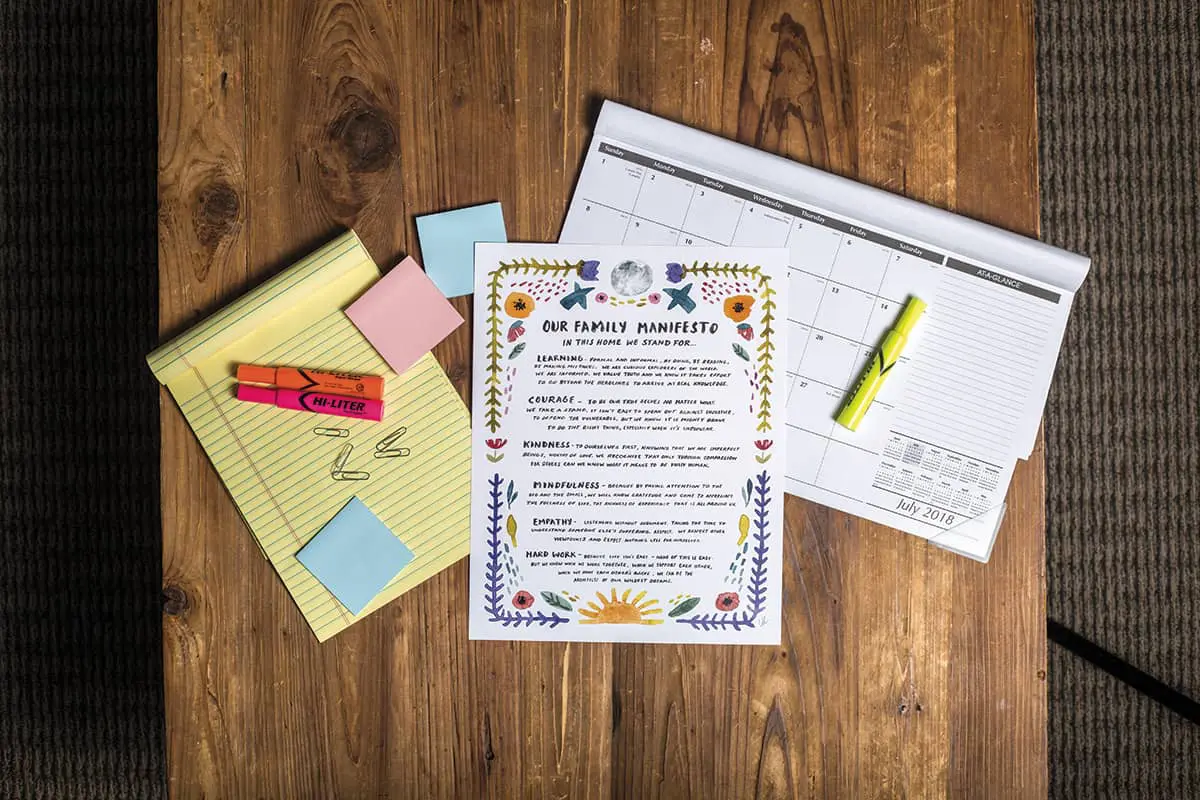By Cate Stillman // Photograph by Ryan Dorgan
—
Over the past decade, I’ve grown my Yogahealer counsulting business into a decent-sized gig. In the process, I’ve sought out and learned from progressive business professionals who have taught me how to become an effective CEO. I’ve borrowed two essential tools from my professional trainings to guide my family toward the unconventional life of our dreams, to maintain a “high vibe” home with little effort, and to hit big goals together. These two tools are values and meetings.
Value vs. Habit
When one of my course members is having a “value-habit discrepancy” with their partner or their kids (meaning their habits aren’t aligned with their values), the first question I ask is: Have you charted your family values? The second question I ask is: Are you holding a weekly family meeting? Because I don’t know of an easier way to align a family.
Allow me to elaborate.
If a group of people who live together fail to have regular meetings to get on the same page—about values, habits, schedules, responsibilities, and conflict resolution—they are making life much more challenging than necessary. Now, I’m up for a challenge, but I’d rather be challenged by big goals than by day-to-day maintenance like scheduling, communication, and behavior issues. With a weekly family meeting, all of these topics become a piece of cake; a walk in the park with birds singing.
No joke.
The weekly family meeting is as dorky as it sounds. But I’m all good with dorky, if it helps avoid miscommunication and other obstacles. I’m for living life aligned to our big goals as individuals, and also as a family. These are the tools we use to get us there:
Tool #1: Charting Your Unique
Values and Goals
Taking time to articulate your values into a family code—like a code of honor—will serve you all and save you buckets of time. And you get to choose your values together. For example, our family value statements include: 1) We are spectacular roommates; 2) We do what we say we’ll do; and 3) We enjoy our time together, as well as apart.
Once you know your values, your family can grasp its distinctive soul, its sui generis (a Latin term meaning “of its own kind”). Hard decisions become easy, behavior issues have a sweet system for resolution, big goals come into view, and you have an intentional, aligned framework to get there.
Next, articulate your goals. My family conducts an annual visioning session around each new year to strategically plan the next phase of our lives together. We break our big goal into more palatable SMART goals (goals that are Specific, Measurable, Achievable, Realistic, and Timebound). Last year, our big goal was to build a house. This year, our goal is to play more.
While we do the heavy lifting on goal planning once a year, we check in at the end of each weekly meeting to see that we’re staying the course.
Tool #2: The Weekly Family Meeting
(my family’s rendition)
Our family meetings start with my daughter, Indy, reading our family values and reminding us of how we chose to align. We all pitch in to highlight where we’ve seen our values in action the week before. And we leave room in the intro to discuss issues and grievances. For example, if someone left dishes in the kitchen before school or work, we have a quick non-chastising chat revisiting our value of We are spectacular roommates. The one who hasn’t lived up to the value gets a chance to understand the impact of their behavior, and to make amends, apologies, and more-aligned choices the next week.
But if we’re rocking our values—meaning our habits and actions align with our values—we’ll take note of that and celebrate our small victories.
Next, we tackle our agenda. You can make your agenda reflect your values, but here is a little framework:
Family Meeting Agenda:
1. What are our desired outcomes for today’s meeting? (3 min.)
2. Read our value code and talk about values. (3-5 min.)
3. What did we learn last week? (1 min. per member.)
4. What are our priorities, goals, and projects this week? (1 min. per member.)
5. How can we support each other this week? (1 min. per member.)
6. How do we want our bodies to feel this week? What do we want to eat? What habits do we want to focus on? (1 min. per member.)
7. Read our big family goal and review our SMART goals. (5 min. as a team.)
Most of these points are covered by quick discussions. As the family food organizer and health nut, I want my core peeps to align their body goals with their eating and sleeping habits. Asking the question How do you want to feel in your body {this week}? strategically followed by What do you want to eat {this week}? opens the door to intentionality and creativity.
I prefer short meetings at regular intervals over longer meetings held more infrequently, so our meetings last only between 15 and 20 minutes. If we can’t stick to our time-based agenda, we’ll schedule another meeting to delve further into a particular topic. For instance, if we’re in disagreement about something big, or if we want to plan our next trip in greater detail, we’ll make a date to discuss that. But we don’t hijack the meeting agenda to do so.
All of this takes practice, so don’t worry about immediately getting it right—just start doing it. Add it to your schedule to follow something that’s already scheduled (I call this habit stacking). If Friday night is pizza night, hold your meeting right after eating. Set the timer for 20 minutes and be done, no matter how far you get. And know that you’ll get better at it with time.
We used to suck at weekly family meetings. We used to skip weeks, even months. But we always came back to the habit.
And like with any healthy habit, we reap side benefits that let us know we’re on the right track. Soon, you’ll benefit from these things, too, like allowing kids and adults equal floor time, acquiring the skills to work as a team, and learning to run an effective meeting based on a shared, desired outcome.
Having the wrong conversation at the wrong time becomes a distant memory. And, in turn, you’ll be training the next generation in important life skills, such as visioning, goal-setting, and teamwork.

